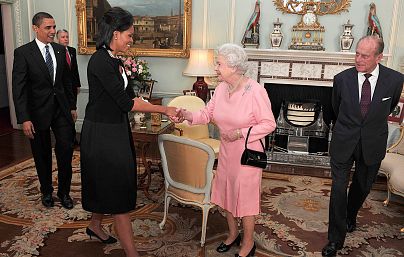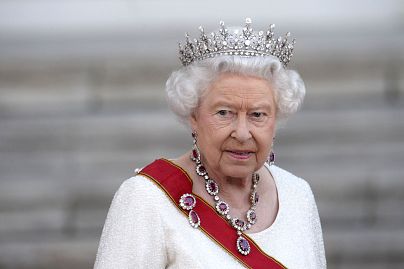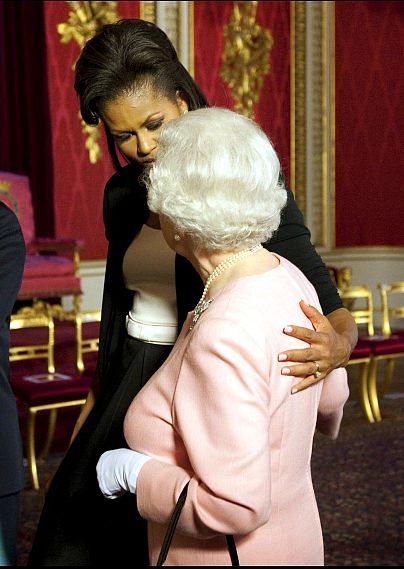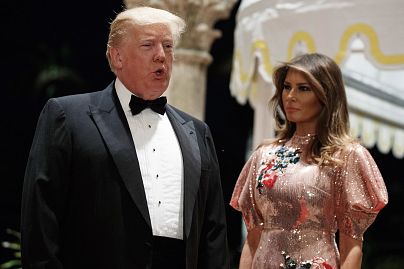As President Donald Trump prepares for his U.K. visit, experts offered some etiquette advice for a royal encounter.
LONDON — As President Donald Trump prepares to make his first visit to the United Kingdom as president next week, one moment could outshine all others: his meeting with the queen.
"He's a massive Anglophile and he'll want to impress," Camilla Tominey, a royal expert and the political editor of The Sunday Express newspaper, told NBC News. "It's going to be quite a moment for him, and I don't think he's going to want to put a foot wrong."
The British government announced Friday that while there'll be no state dinner at Buckingham Palace, the president and his wife, Melania, are scheduled to meet Queen Elizabeth on July 13 at Windsor Castle.
Some, however, have voiced reservations about how Trump — who is not known for adhering to diplomatic niceties — will deal with the delicate issue of royal etiquette and protocol. After all, other high-profile visitors have attracted negative headlines for falling afoul of perceived etiquette breaches.
World
So how can Trump avoid a royal faux pas? NBC News spoke to etiquette and royal experts to find out the do's and don'ts of a royal meeting.
DON'T WORRY ABOUT THE RULES (BUT DO SHOW DEFERENCE)
"It's a great myth that there are lots and lots of rules and formalities" about meeting a king or queen, said Rupert Wesson, academy director at Debrett's, a British coaching and publishing company on etiquette. Actually, he added, "there are surprisingly few."
Indeed, the royal family'sown website says that there are "no obligatory codes of behavior when meeting the queen or a member of the royal family."
DO BOW (BUT ONLY IF YOU WANT TO)
While there are no set rules for meeting a monarch, the royal family's official website does note that many people do "wish to observe traditional forms."
So, if Trump does want to adhere to tradition, the standard protocol for meeting royalty is for men to make a small bow, while women curtsy.
"It wouldn't be a huge sort of sweeping bow," Wesson said. "It's more a nod of the head. It's pretty subtle."
DON'T SPEAK BEFORE YOU'RE PRESENTED TO THE QUEEN
"People say you meet the queen," Wesson said. "In reality, you are presented."
This involves a royal aide announcing a guest's name to the monarch before greetings are exchanged. As with most things related to royal protocol, this isn't a hard and fast rule, more of a nonmandatory tradition.
"So someone would probably say: 'Your majesty, may I present to you the president of the United States, Mr. Donald Trump.' At which point it would be customary for him to bow."
"Your Majesty" is considered the correct way of addressing the queen in the first instance, whereas "your royal highness" is used for other members of the royal family.
"The idea is that you would use the address 'your majesty' initially ... then after that you refer to her as ma'am," Wesson said.
DO REMEMBER YOUR TABLE MANNERS
Trump is known for his fondness for fast food and well-done steak. How will he deal with the refined nature of dining with royalty?
Wesson said the best way to approach sharing a meal with the queen is with "calmness, steadiness, and a little bit of delicacy."
"There are little differences between American dining and British dining," he said. "In British dining, the fork remains in the left hand and the knife remains in the right hand, assuming you're right-handed."
"I think the most important thing is that you relax, you enjoy the occasion and that you're a good guest."
DON'T TOUCH
It's a widely held belief that you should avoid touching the queen, and first ladies, prime ministers and governors general from around the world have all attracted negative attention for this perceived lapse in protocol. Michelle Obama, for example, made headlines when she appeared to embrace the queen in 2009.
The experts NBC News spoke to agreed, however, that the media reaction to stories like this have historically been overblown.
"There was a suggestion that Mrs Obama had overstepped the mark in putting her hand round the queen, but she was actually just being deferential and respectful," Tominey said.
However, it's still wise not to be tactile with the queen, Wesson said.
"The guidelines are, you don't touch the royal family," he said.
The royals' own guidelines state that shaking hands "in the usual way" is an acceptable form of greeting, should the president choose not to bow.
Whether this would resemble the eye-catching handshakes Trump gave Japanese Prime Minister Shinzo Abe or French President Emmanuel Macron remains to be seen.
DO BE YOURSELF
For all the pomp and ceremony surrounding a royal meeting, experts said the most important thing is for Trump to speak to the queen in a relaxed and open way.
"She'll want conversation to flow freely, and I think they'll probably find some common ground in discussing his Scottish heritage and his links to Scotland," Tominey said.
"I think, equally, if Prince Philip is with him, then he'll quite enjoy having a robust conversation because the Duke of Edinburgh enjoys a bit of banter and debate. That could be quite interesting."
World
"You don't have to bow and scrape and lick peoples' boots," Wesson said. "The queen would like to have conversations with people, find out about them and learn about the individual, as well as the affairs of state."
IN SAFE HANDS
The sheer length of Queen Elizabeth's reign means that she has become more experienced at greeting foreign heads of states and dignitaries than almost anyone in history.
Since ascending to the throne in 1952, she's met all of Trump's predecessors as president, except Lyndon B. Johnson.
Trump, therefore, should remember to take the occasion in stride, Tominey said.
"They've done this a hundred times before," she said of the royal family. "She's extremely well versed in the art of diplomacy. Put it this way, he's in safe hands with her!"















